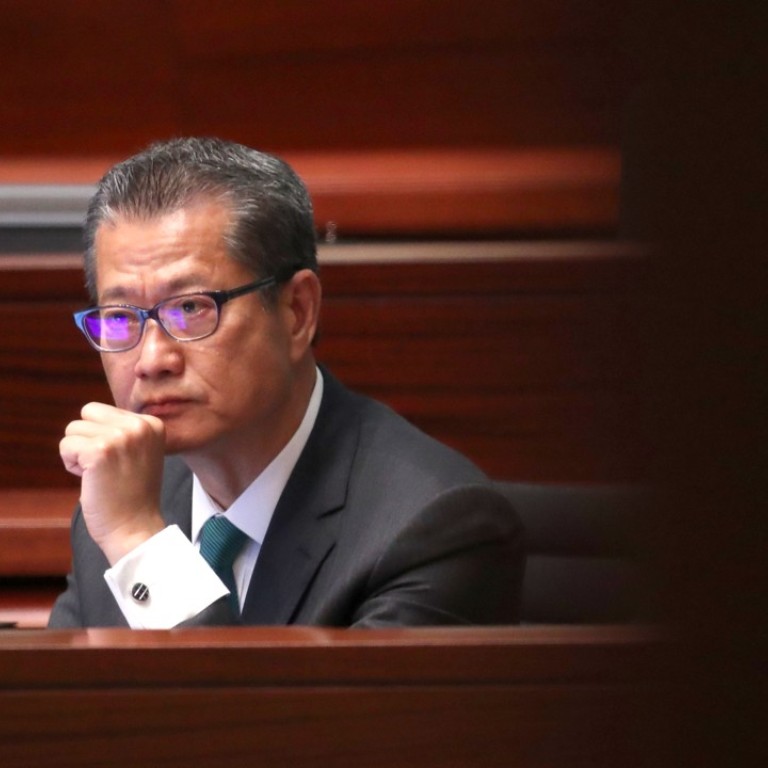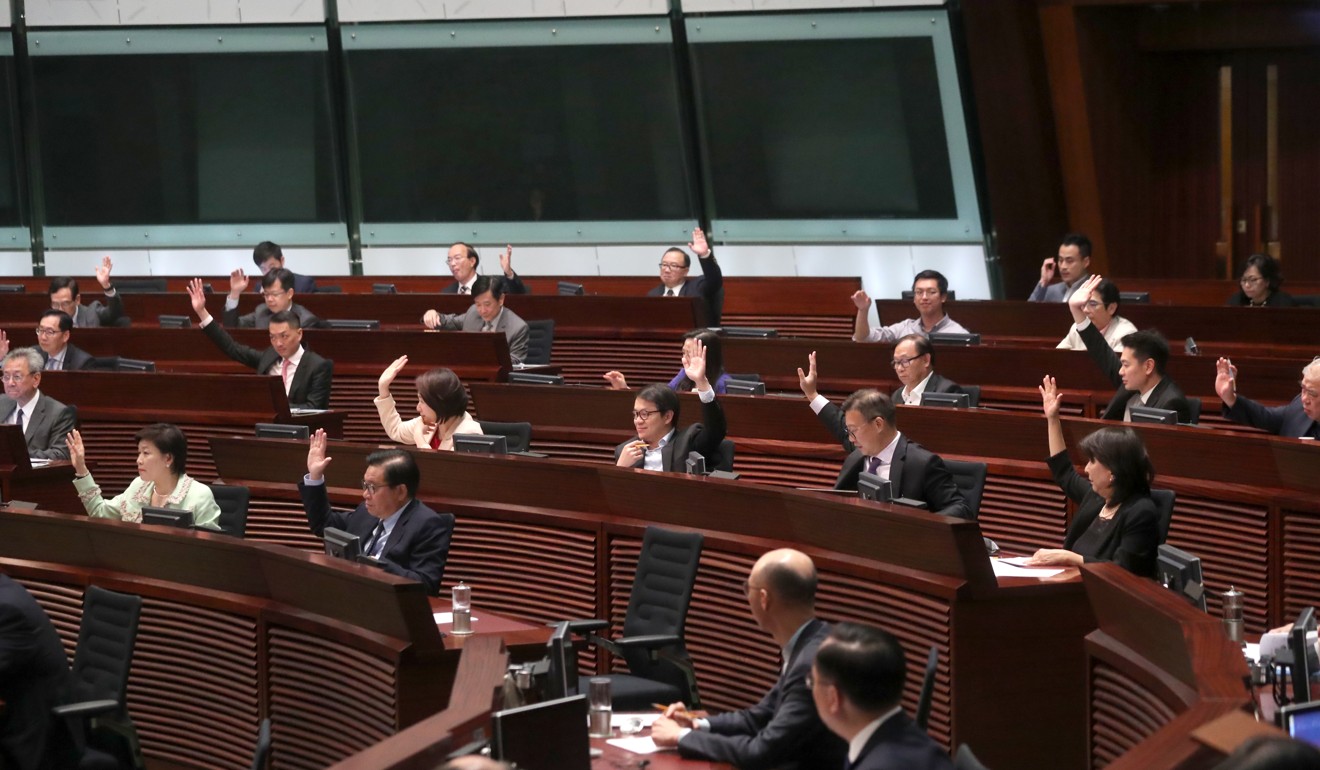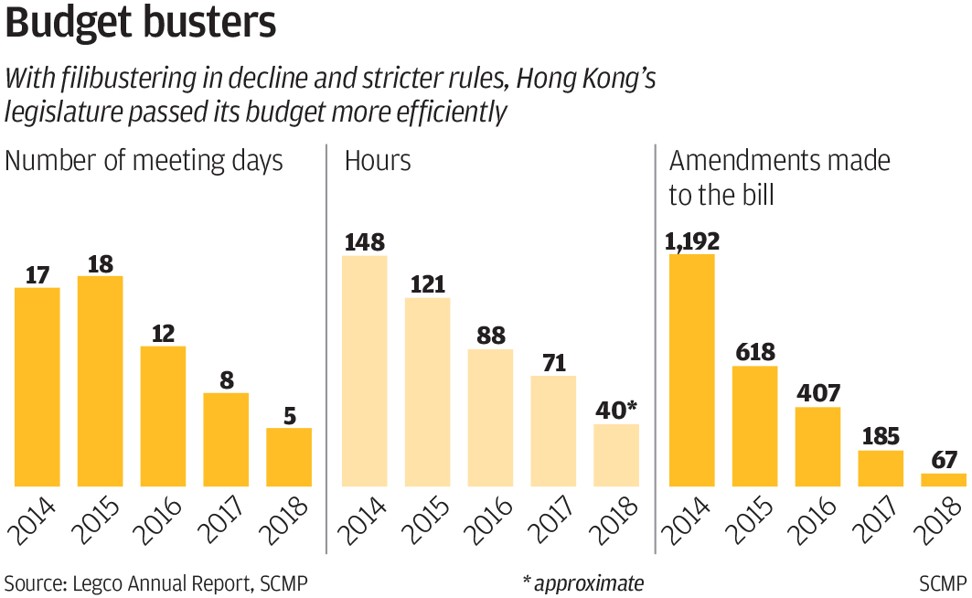
Budget passes through Hong Kong legislature with minimum fuss – but jury still out on better relations
With little filibustering in chamber and relatively few amendments, Legislative Council took just five meetings to debate and vote on financial blueprint – a far cry from bitter wrangling of recent years
Hong Kong lawmakers gave the green light to the government’s annual budget on Thursday evening, marking one of the swiftest passages of the financial blueprint in the past six years.
Among the 43 votes of support in the 68-member chamber were three opposition lawmakers – pan-democrat camp convenor Charles Mok, Kenneth Kai-cheong of the accountancy sector and Joseph Lee Kok-long of the health services sector.

Eleven pan-democrats voted against the budget and eight including the Democratic Party abstained. It was also only the second time since 2008 that the government had secured more than 40 votes for the budget.
Two lawmakers walked out at voting time – pan-democrat lawmaker Shiu Ka-chun of the social welfare sector and Michael Tien Puk-sun of the pro-establishment camp.
The Legislative Council took roughly 40 hours, over five meetings, to debate and vote on the budget. In the five previous budgets, some opposition lawmakers filed hundreds of amendments to slow the process with passage of the budget bill taking as much as three times as long as Wednesday’s.
Six key Hong Kong budget takeaways you need to know: spend, spend, spend on the future
In comparison, it took Legco 18 meetings – or 121 calendar days – to debate the budget in 2015, with some democrats spending hours calling for quorum bells as part of their filibustering efforts.
Federation of Trade Union lawmaker Wong Kwok-kin, also an adviser to Lam, said it was “too early” to conclude that trust could finally be built between the opposition and government.
“It was only because the common enemy, Leung, has gone,” Wong said. “So tensions with the current administration have dropped.”
Mok, who represents the IT sector in Legco, said he supported the budget only because the government increased investment in innovation and technology, and that it was not a question of reconciling with the government.
Education sector lawmaker Ip Kin-yuen also noted that relations between his camp and the government had improved compared with Leung’s term, however he stressed he will not prejudge any of the government’s proposals.
“If they have merit, we will support them; if they don’t, we will oppose them.”
One moderate democrat, who declined to be named, noted it was “counterproductive” to drag out scrutiny of the budget. In a rare move last November, three democrats voted in favour of the “motion of thanks” on Lam’s maiden policy address. Mok did not vote to avoid taking a stance on the matter.
Cash handout scheme will cost government HK$330 million to administer
The handout scheme also passed in Legco on Thursday with 48 votes in favour, two against and one abstention. However, the cash would only be delivered after applications closed on April 30 next year.
Some pan-democrats conceded the administration had taken some of their ideas on board, including introducing more tax brackets and an additional HK$2 billion recurring expenditure on education.
Kenneth Leung said he voted in support of the budget because the government invested more in health and education, although he was against the cash handout scheme.
“It was the first budget for this administration, so I gave them the benefit of the doubt, or an affirmation under doubt,” Leung said.
Democratic Party chairman Wu Chi-wai conceded the government had agreed to the cash handout plan but said the administration costs were too high, and it should also improve elderly care and medical planning for the poor.
Top 10 landlords enjoy budget rates waiver of HK$256 million
Council Front lawmaker Eddie Chu Hoi-dick however said despite there being no filibustering, the pro-democracy camp should fight for a greater say in the planning of finances. “What’s the duty of democrats? As if we’re faithful followers [of the financial secretary], if you take care of the interests of our sectors, we’ll just vote for you?” he asked.


